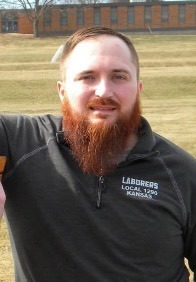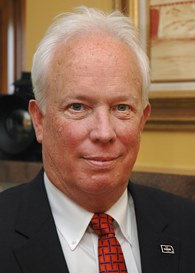by Celia Llopis-Jepsen, KCUR and Kansas News Service
The Republican secretary of state asked a private company to shut off a software function that makes it easy to retrieve certain public information.
Kansas Secretary of State Scott Schwab broke state law by taking action to prevent provisional ballot information from becoming public, the state’s second-highest court ruled on Friday.
The judges said that Schwab, a Republican, told a private company in 2020 to shut off a software feature that gave his office easy access to provisional ballot data and which, by extension, allowed the public to request the information.
So the company — which stores the Kansas statewide voter registration database — turned off the function at his request.
A three-judge panel unanimously concluded that the Kansas Open Records Act, or KORA, doesn’t allow Schwab to do that.
“That action — choosing to conceal rather than reveal public records — violates KORA,” Kansas Court of Appeals Judge Stephen Hill wrote.
A spokesperson for the secretary of state’s office said Friday that staff were reviewing the court ruling. The office has 30 days to appeal.
The ruling defends the public’s right to access government records, said Steve Leben, a law professor at the University of Missouri-Kansas City and former judge on the Kansas Court of Appeals for 13 years.
“It’s definitely good news for the public,” Leben said, because it upholds what the Legislature made clear in its open records law. “(The Legislature) said directly in the open records act, that act is to be liberally construed to promote openness of public records.”
The backstory to Friday’s ruling starts in 2019.
That’s when Davis Hammet, founder of the Kansas civic engagement group Loud Light, requested provisional ballot information from the state.
His group wanted to know who had cast provisional ballots in the 2018 general election. Loud Light uses provisional ballot information to contact voters and let them know what steps they need to take to make sure that their vote ultimately gets counted.
Voters have to cast provisional ballots in certain situations. For example, if they have moved to a new address but forgot to report the address change to the county clerk, then election workers are unable to verify at the polling site whether the person is a valid voter. So the voter gets to cast a provisional ballot.
Voters who cast provisional ballots may need to take additional steps in order for their vote to count. For example, they may need to show a valid government-issued ID card.
The secretary of state’s office denied Hammet the provisional ballot records. Hammet sued and a district court agreed that the records should be public and ordered Schwab to release them.
So Schwab’s office handed over the records.
But in August 2020, Schwab asked the private company that stores the records to switch off the software function that gives his office easy access to the data.
The next time Hammet asked for updated provisional ballot information, Schwab’s office told him it didn’t have access to the records anymore. It suggested Hammet should instead ask each of the state’s 105 counties individually to give him their provisional ballot information.
Schwab’s office said it couldn’t produce the information centrally anymore unless Hammet agreed to pay more than $500 to have a software expert spend three hours accessing the information through a more complicated process.
So Hammet tried to get the records by contacting all 105 counties, but most counties wouldn’t comply.
Hammet sued Schwab again.
Now the Kansas Court of Appeals rules Schwab violated the Kansas Open Records Act by instructing the private company to shut off the function that makes it easy for his office to view the provisional ballot information, and then telling Hammet he would now need to pay hundreds of dollars for information that used to be free.
“The secretary of state here directed his computer software vendor to turn off a computer report feature,” the court concluded. “By turning off the report capability, the secretary denied reasonable public access to that public record and the information within it.”
Hammet said Friday’s ruling “brings the Kansas open records law into the digital age.”
“It says, if you want to use a private data vendor to store records, that’s fine, but the people of Kansas still have a right to see those records,” Hammet said. “You can’t hide behind how you store the records to deny the people of Kansas … from looking at these things and making sure that the government is operating for the public good.”
Hammet first requested provisional ballot records when the 2018 Republican gubernatorial primary between Jeff Colyer and Kris Kobach came down to a narrow margin of victory and Johnson County had tossed out hundreds of ballots.
He says his persistent research into why some don’t get counted and pressure on officials to release public records that shed light on the reasons, have pressed counties and the state to improve.
In 2019, the Kansas Legislature changed state law to say local election officials must inform voters if they plan to toss out their ballots because they believe the voters’ signatures don’t match the signatures on file. This gives the voter the opportunity to prove their ballot was valid.
Schwab’s office has 30 days to appeal Friday’s decision to the Kansas Supreme Court. Otherwise, a district judge will order his agency to have the private vendor restore easy access to provisional ballot data, and then give Hammet the information.
Leben said Friday’s ruling is significant because court rulings on open records law aren’t frequent, and some aspects of how open records law applies in the real world remain murky.
“One of the situations in which the application of the open records act is unclear,” he said, “is the large amount of information that government stores on computers. And this case is significant because it involves a directive to make information on the computer easily accessible.”
At least, he said, the ruling applies to situations where the government takes action to make easily accessed database information harder to retrieve.
Celia Llopis-Jepsen is a reporter for the Kansas News Service. You can follow her on Twitter @celia_LJ or email her at celia (at) kcur (dot) org.
The Kansas News Service is a collaboration of KCUR, Kansas Public Radio, KMUW and High Plains Public Radio focused on health, the social determinants of health and their connection to public policy.
Kansas News Service stories and photos may be republished by news media at no cost with proper attribution and a link to ksnewsservice.org.
See more at https://www.kcur.org/news/2022-07-22/kansas-court-says-the-secretary-of-state-violated-open-records-law-and-made-it-hard-to-get-documents



